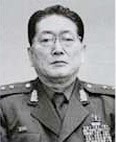The Ghost of the Morningstar General Haunts the New Year
 Daily NK put 2009 to bed with a report on a new paper by the venerable Jeong Sung-jang. Jeong Sung-jang predicts that 2010 will see an official announcement of Kim Jong-un’s succession after a meeting by the KWP Central Committee which will designate him as successor by acclamation. It is not clear how the succession process will play out in the KPA, but is reported “that the succession system has been accomplished in the military.” It is likely institutional changes made in the National Defense Commission and the Ministry of People’s Armed Forces will facilitate a power succession within the KPA. It is also reported that in Jeong’s end of the year assessment Kim Jong-un had risen to the level of the top North Korean elite, in the company Jang Song-thaek, Gen. O Kuk-ryol, VMAR Kim Yong-chun and OGD Senior Deputy Director Ri Je-gang. The Morningstar General is directly involved in personnel appointments and management of senior KWP cadres, and is floating his recommendations to General-Secretary Kim.
Daily NK put 2009 to bed with a report on a new paper by the venerable Jeong Sung-jang. Jeong Sung-jang predicts that 2010 will see an official announcement of Kim Jong-un’s succession after a meeting by the KWP Central Committee which will designate him as successor by acclamation. It is not clear how the succession process will play out in the KPA, but is reported “that the succession system has been accomplished in the military.” It is likely institutional changes made in the National Defense Commission and the Ministry of People’s Armed Forces will facilitate a power succession within the KPA. It is also reported that in Jeong’s end of the year assessment Kim Jong-un had risen to the level of the top North Korean elite, in the company Jang Song-thaek, Gen. O Kuk-ryol, VMAR Kim Yong-chun and OGD Senior Deputy Director Ri Je-gang. The Morningstar General is directly involved in personnel appointments and management of senior KWP cadres, and is floating his recommendations to General-Secretary Kim.
Munhwa Ilbo wades into the mystery of photographs of Kim Jong-un, his and his brother Jong-chol’s use of pseudonyms. It also identifies Kim Jong-un as working in the State Security Department. MI says it best: “Everything about Kim Chong-un is cloaked in a mystery, be it his photo, birth date or job title.” RFA [thank you Curtis] carries an essential report that attempts to uncloak Kim Jong-un a bit. It reports that made Director of the State Security Department during in a March 2009 by General-Secretary Kim and his son, and that Jong-un currently works with SSD’s senior deputy director Col. Gen. U Tong-chuk, previously known as SSD’s daily
manager. RFA’s sources await a birthday celebration in honor of Kim Jong-un on 8 January. Although, it is also reported by Japanese and South Korean media that Kim Jong-un’s revised birthday may be in June.
Asahi Shimbun nicely grafts an early 2010 China trip by Kim Jong-il onto the Kim Jong-un story. It reports (as did RFA) that Kim Jong-un was a member of Kim Jong-il’s entourage during his tours in the latter half of 2009 and teases the possibility that Jong-un will join him on the train to Dandong. It also replays the various North Korean elites who have traveled to China since Wen Jibao’s October 2009 visit and “a number of North Korean sources have said that actual preparations are underway.” Asahi Shimbun also finds a new way to gloss North Korean reports on Kim Jong-il’s appearances: “Kim Cho’ng-un started to give on-site guidance, and that from several months to a year after that, Kim Jong Il began visiting the same locations to confirm the results of the guidance. . .instead of reporting that Kim Jong Il expressed ‘satisfaction’ about the work being done when he gave field guidance, Kim now expressed ‘great satisfaction.'”
This is the first occasion where multiple reports that indicate Kim Jong-un’s department rank and position. This corroborates earlier accounts of Kim Jong-un working with or, as they say, being groomed by Jang Song-thaek and Ri Je-gang. Despite being subordinate to the NDC, the State Security Department reports or has ties to the KWP Administration and Organization and Guidance Departments. Director of the State Security Department provides a tidy credential to advance Kim Jong-un within the NDC or as Supreme Commander under a hereditary succession. If these stories are accurate, Kim Jong-un is working in at an intersection of the National Defense Commission (including the KPA) and the KWP. U Tong-chuk, who became a member of the expanded NDC in April 2009 and was reported to have traveled to Beijing in November, may be Jong-un’s immediate groomer/tutors.
Running the State Security Department is not a dream job, particularly for a budding successor. It lost its prestige in favor of the Ministry of Public Security in the late 1990’s. There are rumors of corruption (although these could be concocted and even dated), and SSD has been shuffled several times in the DPRK’s chain of control. Kim Jong-il previously had it under a kind of trusteeship and was its de facto director. And yet, the State Security Department is quite powerful, particularly in its interactions with North Korean citizens. SSD personnel provide one of the layers of security around Kim Jong-il. It is also a key agency in terms of any transfers in power or contingencies that affect the DPRK leadership, as it one of the first parts of the internal security apparatus that will mobilize. It’s also not a bad place from which to engineer a currency denomination. Kim Jong-un is not at the center yet, be is certainly on the periphery of the core North Korean elite.
